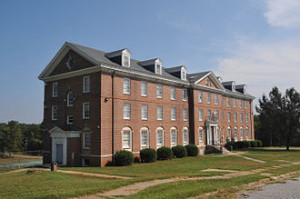St. Paul’s College president: Federal funds to house border kids like ‘manna from heaven’

DEBT DOLLARS: A deal with the feds to house hundreds of children who crossed the border illegally would have given the shuttered St. Paul’s College $160,000 a month.
By Kathryn Watson | Watchdog.org, Virginia Bureau
ALEXANDRIA, Va. — When it closed last year, Lawrenceville’s private St. Paul’s College had some serious debts to pay.
St. Paul’s College President Pete Stith estimates the school’s guaranteed pension fund for former employees needs about $2.9 million. The shuttered school also owes mBank in Michigan about $1.3 million. On top of that, the college needs to cover about a quarter million dollars worth of other debts — like back pay to telephone services and power companies.
So accepting the federal government’s offer to pay the historically black college $160,000 a month for housing children who cross the U.S.-Mexico border illegally made financial sense.
“If they’d stayed there long enough, meaning about three years, we think we would have had enough to pay off the debt,” Stith told Watchdog.org on Tuesday. “The debt was one of the reasons why the school closed.”
After the townspeople of Lawrenceville protested the federal government’s contract with St. Paul’s College in June, the Health and Human Services’ Administration for Children and Families backed down.
“This project would have brought in another 200 positions,” Stith said, estimating local employment to supervise the undocumented children. “It would have had a major impact on this town, a positive impact on this town.”
“I said, you know what, this is manna from heaven.”
Scores of facilities around the nation have benefitted financially from the border crisis.
Several facilities around Virginia, including Bristow-based Youth for Tomorrow, the Shenandoah Valley Juvenile Detention Center, Alexandria’s Northern Virginia Juvenile Detention Center and Richmond’s Commonwealth Catholic Charities, have contracts with the federal government to house children who cross the border illegally. Watchdog.org was the first to report both the Alexandria and the Richmond facilities.
Craig Fifer, director of communications and public relations for the city of Alexandria, told Watchdog.org earlier this year the shelter program is “actually a benefit to the region,” and helps offset some of the city’s costs.
When Home Opportunities Made Equal of Virginia approached Stith about joining them in a racial discrimination housing complaint against the town of Lawrenceville, Brunswick County and Brunswick County Sheriff Brian Roberts, Stith presented the idea to the college’s board of trustees. The board unanimously decided to join the complaint sent to the U.S. Department of Housing and Urban Development.
Stith knew people at HOME because he served on that board until late this winter.
“HOME, after reading the newspapers and looking at the video of the meeting, contacted me and said they wanted to file a complaint about the housing situation and they were going to do it on their own, but then they thought with us being a party to the complaint it would make it much stronger,” Stith said.
But not everything thinks their complaint is strong.
“There does not appear to be any evidence of racial animus by Lawrenceville residents toward any group,” said Bob Dane, communications director with the Federation for American Immigration Reform. “Rather, this a community simply saying ‘no thanks’ to an unfunded federal mandate that would place individuals who have no legal right to reside in the United States within their community and impose additional taxpayer costs for education. Alleging discrimination is usually the last resort of those who are losing the argument, or in this instance … a school losing money looking for a quick fix with no regard for the broader community interest.”
Stith doesn’t expect to get money out of the complaint, but hopes the housing deal will be reconsidered.
People shouldn’t discriminate against another group of people just because they don’t like where they’re from, Stith said, comparing the children coming over the border to Europeans who landed in America.
“Those people didn’t have any passports or letters of recommendation or a utility bill to do what they did,” Stith said. “We’ve always been a nation of immigrants. Just because someone comes from an area that has some high criminal activity doesn’t make that person a criminal.”
“Our message is, don’t do this. That’s not right, that’s not the American way.”
Locals protested the plan to house illegal immigrants partly because they said the government and St. Paul’s College had forged a deal without their input or consent. Stith, however, said he went through all the necessary steps.
“Some have accused me of ramrodding this thing down the throat of the community, which is not true,” Stith said. “The college is a private incorporated entity that can lease its property (and) can use its property as long as it meets the zoning requirements, which it did.”
Stith and HOME allege in the complaint that even though local officials never took a vote to block the deal, their influence in the process is legally sufficient for a complaint.
“I do not have the authority as the leader of a private college to go into Brunswick County and call a public meeting,” Stith said.
Ideally, Stith said he hopes the school can re-open once debts are paid off and serve as a satellite campus for Virginia Commonwealth University or the University of Virginia.
— Kathryn Watson is an investigative reporter for Watchdog.org’s Virginia Bureau, and can be found on Twitter @kathrynw5.







